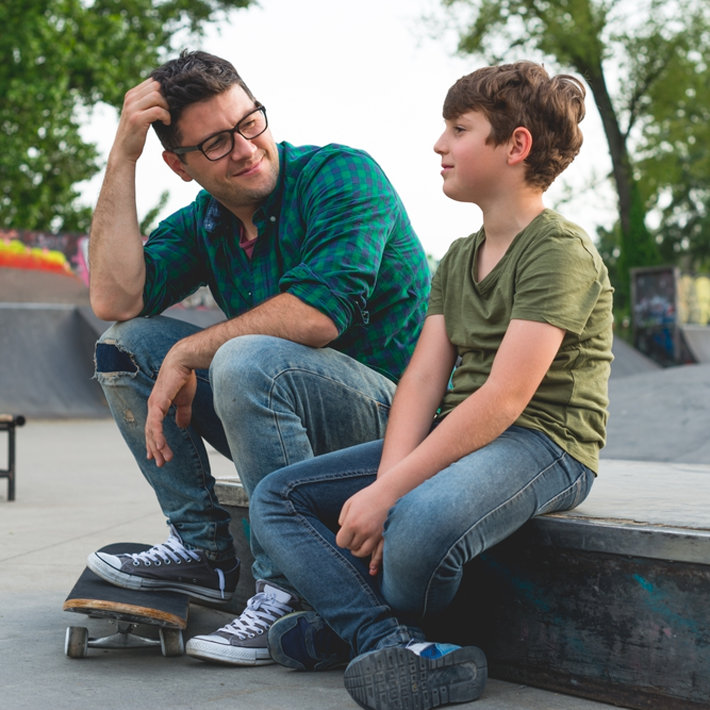“Talking About It”—Follow These Tips When Discussing Addiction Treatment with an Addicted Loved One

It’s never easy having a family member or loved one who struggles with a drug habit. We want to help them get clean, but we often don’t know how. A conversation with your loved one is a great place to start, so we’ve included a dozen “do’s and don’ts” to keep in mind when having such a discussion.
The Do’s And Don’ts of Talking to an Addict about Substance Abuse
Listed below are six “do’s” and six “don’ts” for when you are speaking with your addicted loved one. Study these points and think of examples and scenarios in which you could apply them to your next conversation with him or her.
The Do’s:
Do be respectful.People who struggle with drug addiction and alcoholism are under immense stereotype and stigma. They are continually being told that they are no good, that they are just criminals and gutter rats, that they are the dregs of society, that they belong in prison with the rest of them, and so on. They’ve heard this dozens of times. It’s ingrained in their mind by now to be defensive of those who discuss their drug habits with them. With that in mind, be sure to
be respectful, even if tempers rise.
Do make it a discussion of a “healing journey,”
but don’t necessarily put a time limit on it. When you’re talking, discuss the person’s drug habit on the premise and assumption that the person
isgoing to get well. Don’t even mention a possibility or a scenario that includes them not getting well. But by that same token, don’t make it about them
getting help now. Make the discussion about the “healing journey” as the
First Nations Health Authorityputs it.
Do meet people where they are at, rather than where you think they should be at. Such is another valuable piece of wisdom from the First Nations Health Authority. When it comes to discussing addiction and getting help, it does not matter where you think the person should be. They’re not there yet, so addressing the issue with them under that pretense will get you nowhere. Instead, meet them where they are at and try to make the conversation about inching them closer to a realization that they do need to get help.
Do take your time, and have multiple conversations with your loved one if necessary. This is a process. Occasionally, an addicted loved one will come around during the first conversation—but not often.

Do your research on drugs and alcohol. The more you know about drugs and alcohol, the better prepared you will be in helping your loved one. You would not attempt to convince a physicist that his theories were erroneous without studying some physics first, so make sure you research addiction theory and the ins and outs of chemical dependence, mental reliance, the different types of drugs, and so on.
Do help them. Your loved one does not need to walk this path alone. If your loved one seems to be coming around as a result of your conversations with them, help them further by locating treatment centers for them. Work closely with your loved one to find a rehab that is amicable to their needs and wants and which offers excellent, long-term services of a residential nature.
The Don’ts:
Don’t focus only on addiction. The person is not the addiction. They’re not synonymous. Make the conversation about other aspects of the individual, particularly the excellent and positive points of their character. Rather than saying, “You have an addiction, and you need to change,” say, “You bring so much greatness to the world, I hate to see you hampered by addiction.”
Don’t dive straight for the objective, which is to get the person into an addiction treatment center. That’s putting the horse before the cart. Engage in pleasant discourse first, and discuss the ins and outs of addiction and the kinds of effects its having, how your loved one feels about it, how they see the future to be if they keep using, and so on. Get them thinking with getting clean before you suggest that they should do so.
Don’t get tense with your loved one. Some people might think that the best way to get through to an addict is to have a difficult and “unpleasantly confrontational” conversation with them. Not so. They’re more likely to storm off on you. Connecting with them later on will be more difficult as a result. Better instead to keep your calm and keep the conversation as mellow and pleasant as possible.
Don’t be accusative or angry at your loved one. Your grievances with them are most likely legitimate, but trying to “get that through to them” is not going to get you anywhere. They are not yet at a place where they can take full responsibility for the harm that they have caused others. That’s a state they will likely arrive at by going through an addiction treatment program.
Don’t get defensive if your addicted loved one lashes out at you. Bear in mind that this certainly might happen, as addicts often become defensive and accusative in the direction of changing the subject to focus on you and not them. Don’t let them get under your skin. Know that you’re likely touching on the right issues if they’re getting defensive with you, and keep attempting to move forward with them towards a resolution.
Don’t enable them. Enabling includes anything like giving an addicted loved one money or any kind of assistance that in some way makes it easier for them to continue using drugs and alcohol. This could include lending them a car, giving them a cell phone, lending them cash, and so on. An addict might ask for something like that during a conversation. Say no in the politest way possible.

In summary, the underlying strategy is to be calm, cool, and collected, to show your loved one that you do love them. The goal is to get them help for their addiction, to do so without being antagonistic or rude, to take your time and to stay in it for the long game, and to make progress in each conversation towards your loved one realizing that they do need to get help.
Health Line talks about how trying to help someone with an addiction can be a “Long, challenging, and painful process.” I tend to take a more optimistic view, but there’s some truth in Health Line’s phrase. Take your time. Don’t get offended or upset. Stay calm and show nothing but love and compassion for your family member or loved one. And above all else, persist.
Sources:
- http://www.fnha.ca/Documents/FNHA-Talking-About-Substance-Use-Infosheet.pdf
- https://www.healthline.com/health/addiction/helping-an-addict
Reviewed and Edited by Claire Pinelli, ICAADC, CCS, LADC, RAS, MCAP


